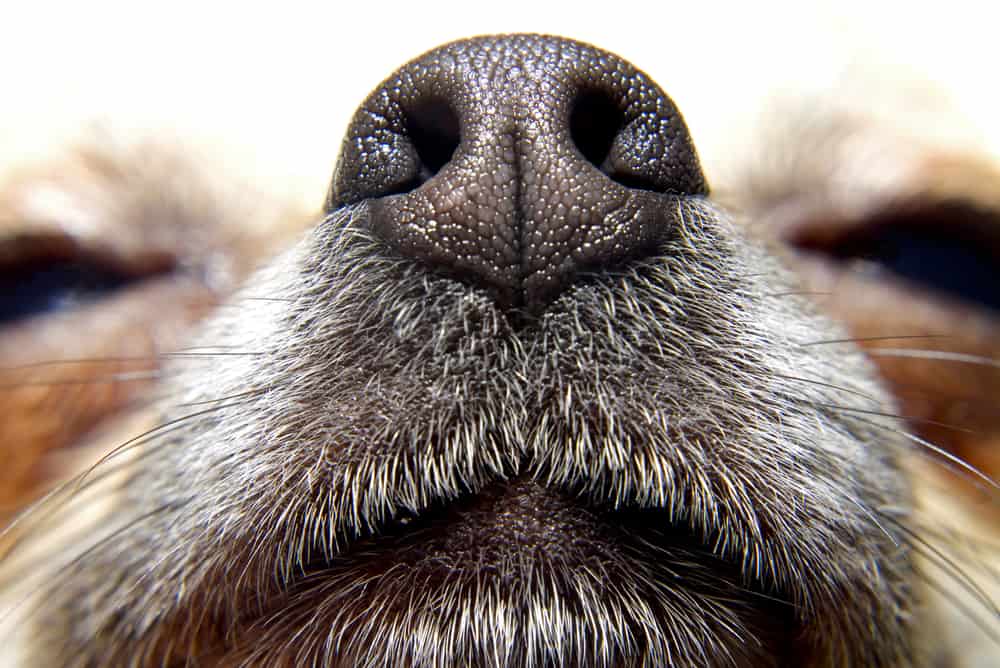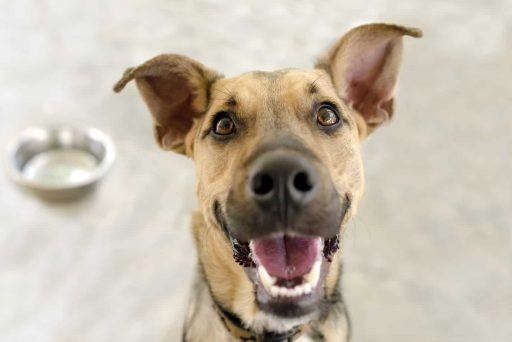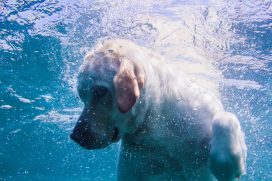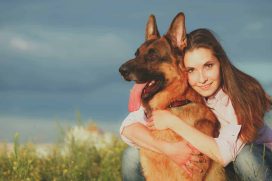Have you ever initiated a game with your dog and noticed him begin to sneeze?Is it the toy? Is he having an allergic reaction? Should you be concerned?
Why do dogs sneeze when excited? An excited dog sneeze is a form of communication to other dogs, letting them know they are playing. It can also be attributed to the tickling of their highly sensitive noses from facial expressions used during play.
A dog’s play sneeze is a little different to a real sneeze. It sounds more like a huff-sneeze when playing. Exhale sharply through your nose, it sounds kinda like a sneeze but is a little different. This is very similar to what a dog is doing when he “sneezes” during play.
Is this sneeze a form of communication, just a sensitive nose, or just a weird bodily function?These are the three main theories that exist as to why dogs sneeze when excited. Let’s take a closer look at each one.
1. A dogs Sensitive Nose causes them to sneeze when excited
One theory as to why dogs sneeze when playing, is that dogs have sensitive noses.
It is certainly true that a dog has a much more sensitive nose then us humans. If fact their sense of smell can be 100,000 times more acute then humans!
They have 300 million olfactory receptors and us humans have a mear 10 million! That’s a pretty sensitive nose.

Of course, dogs do sneeze to expel things from their noses. A sneeze can actually expel things at up to 100 miles per hour!
It is thought that when a dog takes hold of a toy, their whiskers get pushed up and tickle their nose resulting in a sneeze. Or the dog is lifting its lip with excitement and that tickles the dog’s nose and the dog sneezes.
When my dog gets excited and sneezes when I have visitors over, he often has no toy in his mouth and he doesn’t usually lift his lip.
So, the sensitive nose issue could be true in some cases, but I don’t know that it is true for all cases.
2. Dogs Use sneezing as a form of Communication
Dogs have may ways of communicating.
They growl to let people and other animals know “this is mine, back off, or something is not right.” They bark to alert you that the guests are arriving. They play bow to initiate play. They paw at you to let you know that they want something.
They talk to you with their eyes looking from the snack in your hand to your eyes and back again. Indicating that they want the snack.
In fact, there are lots of behaviors that dogs can exhibit to show stress, reduce the stress of other dogs, appease other dogs, and generally get out of sticky situations.
These behaviors are called calming signals
They include things like yawning, looking the other way, licking their lips, laying down, sitting with one paw lifted, and even submissive urination.
Calming signals can work to clam the dog doing the signals as well as other dogs involved in the situation. As a dog owner, it can be really helpful to familiarize yourself with these signals so you can tell if your dog is stressing out. If you see these signs it might be best to remove your dog from the situation if possible.
Dogs communicate in so many more ways than we are even aware of. Could it be that this simple sneeze that dogs do before or during play is part of their elaborate communication system?
In a study where wild African dog packs were observed, researchers noticed that the dogs would sneeze before a hunt. One of the dogs would initiate the excitement for a hunt. The others would get excited and start to run about.
But the hunt only happened if enough of the dogs sneezed. The more sneezes that the dogs did, the more likely that the pack would hunt. If there were not enough sneezes then the hunt was off and the pack would nap instead.

The researchers also noted that if the pack leader initiated the hunt, fewer of the pack had to sneeze before the hunt began. If a lower-ranking pack member tried to get a hunt going they required a lot more sneezes for the hunt to start.
It would appear that this sneeze is a type of vote. Do we go on a hunt or do we not? Sneeze if you agree!
Now these are wild African dogs and not a snuggly Bichon Frise, but could their communication actually be similar? When your dog sneezes is he asking if you want to play (the modern dog’s “hunt”)?
Observe your dog when he does the sneeze and see if you think it’s a form of communication.
It has been observed by some, that when a dog is play-fighting they will often sneeze as an indication that they are just playing. Dogs do not do this sneeze in a real fight.
So, perhaps for our more domesticated dogs, a sneeze is an indication to other dogs that it’s play time, and not time for a fight.
3. Sneezing Is Voluntary Bodily Function Before Play
The researchers on this wild African dog study thought that the evidence was a bit inconclusive.
They wondered if perhaps the sneezes could have been a voluntary bodily function that happens when dogs get excited. Perhaps they are making sure that their airways are cleared before a chase, game, or potentially exciting situation.
Just like how some dogs will choose to eliminate right before they go into the agility ring to make sure they are as empty as possible and ready for action.
This could explain why my dog was sneezing at my neighbor, he was excited but he didn’t get a toy or anything to initiate play. Or, perhaps he was just excited. But then again, perhaps he was waiting for my neighbor to sneeze back and agree to the game. Hard to know.
Other Reasons A Dog Sneezes
Just like us, dogs sneeze when they have things in their nose that they need to get out. It can be helpful to pay attention to your dog and notice if they are sneezing more than normal.
This could be a sign that your dog got into something that is bothering his nasal passage or that he is coming down with an infection like kennel cough.
Be sure to take your dog to vet if you suspect that he has something going on because he is sneezing so much. Especially if he is displaying other symptoms such as coughing, nasal discharge, watery eyes, or dental issues. Dental disease can very easily invade the nasal passages as well.
Dog Reverse Sneezing
This is another odd sneeze that dogs sometimes experience. My dog will often reverse sneeze if he gets close to lawn chemicals or a recently treated yard. It’s a pretty freaky thing to watch and usually puts people into a bit of a panic. Dogs often reverse sneeze for similar reasons as to why they really sneeze, because something is in their nasal passage.
Here’s a video explaining what is going on:
Episodes of reverse sneezing will usually last no longer than one minute. Gentle stroking may help to relive a reverse sneeze session. Also, a gentle tap on the nose can be helpful. Encouraging your dog to swallow can be helpful too, this can be as simple as offering your dog a treat. Gently massaging your dog’s throat may be helpful too. Blowing small puffs of air into your dog’s face may help to stop the reverse sneezing as well.
It is not a good idea to try to open your dog’s mouth or to hold them tight or hold them down. Let the dog have a minute to clear the airway if the reverse sneezing continues you may want to seek veterinary help.
Conclusion
There are three main theories as to why dogs sneeze when excited. The first is that they get tickled by their whiskers, or it could be a form of communication, or perhaps a bodily function we do not yet understand.
It makes sense that a sneeze could be a form of communication that dogs use on us. Dogs have such an intricate way of communicating with us, other animals, and each other. So much of a dog’s communication we don’t understand or even notice. There is so much more to learn about dog language.
I wonder if we can use the play “sneeze” on our dogs to initiate a play session. Give it a try, do a little sneeze-huff and see if you can get a rise out of your dog and initiate a rousing play session!
How exciting would it be for our dogs if we took an interest in learning their language and communicated with them in their own language?
Sources
- http://www.canineuniversity.com/articles/behavior/behave_08.html
- https://www.petcoach.co/article/10-ways-dogs-try-to-communicate-with-us/
- https://www.pbs.org/wgbh/nova/article/dogs-sense-of-smell/
- http://en.turid-rugaas.no/calming-signals—the-art-of-survival.html
- https://curiosity.com/topics/dogs-give-unusual-clues-to-tell-us-theyre-playing-around-curiosity/






